Abstract
The mutagenic and cytotoxic activity of two newly synthesized doxorubicin derivatives and of one daunorubicin derivative were studied in V79 Chinese hamster cells and bacteria (Salmonella typhimurium and Escherichia coli). The results showed that all the compounds tested were cytotoxic and mutagenic for both prokaryotic and eukaryotic cells. However, in both systems, the two 4-desmethoxy- and the 4'-desoxy-derivatives were more active than the parent compounds, indicating that modifications in the aglycone or in the sugar moiety can produce appreciable changes in the biological properties of the anthracycline antibiotics. The in vitro activities observed in this study correlated with the in vivo antitumour potency.
Full text
PDF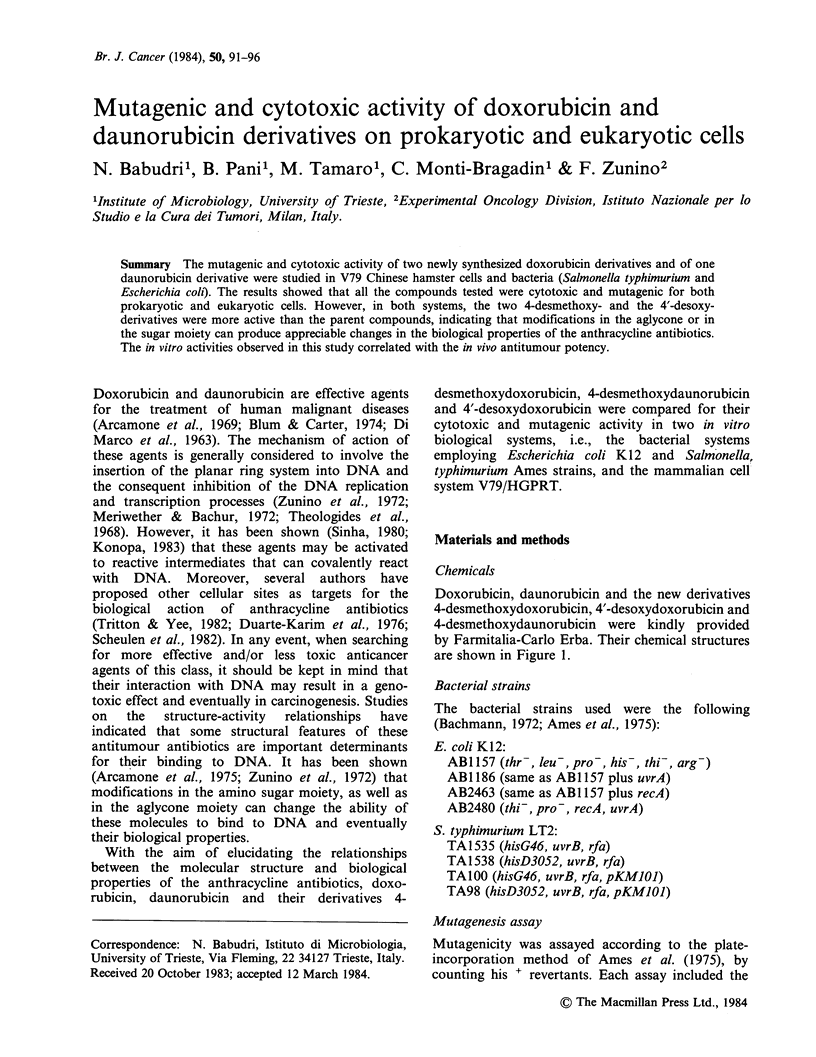
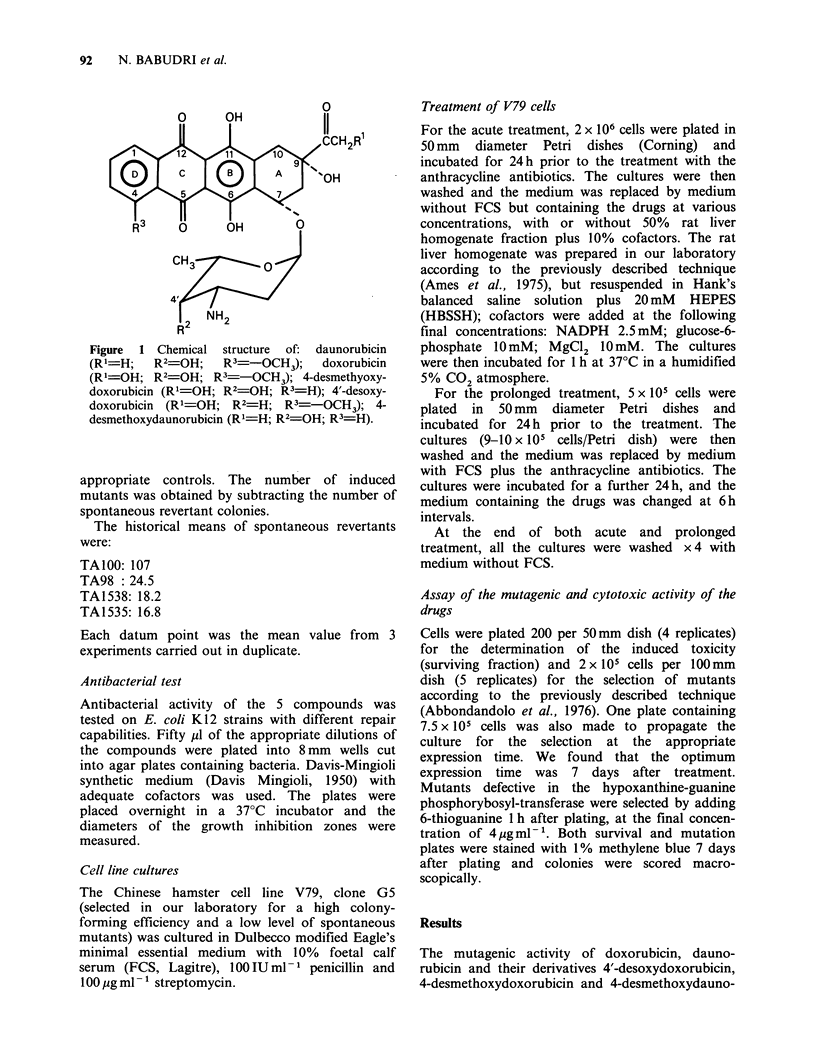
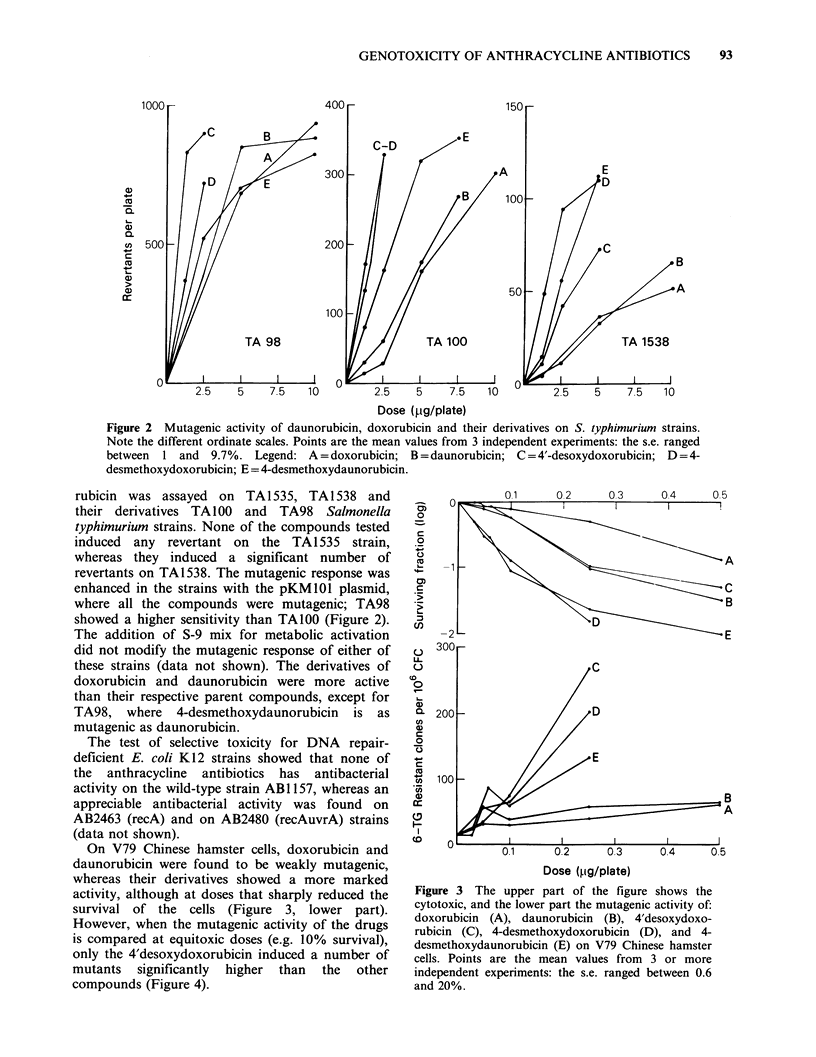
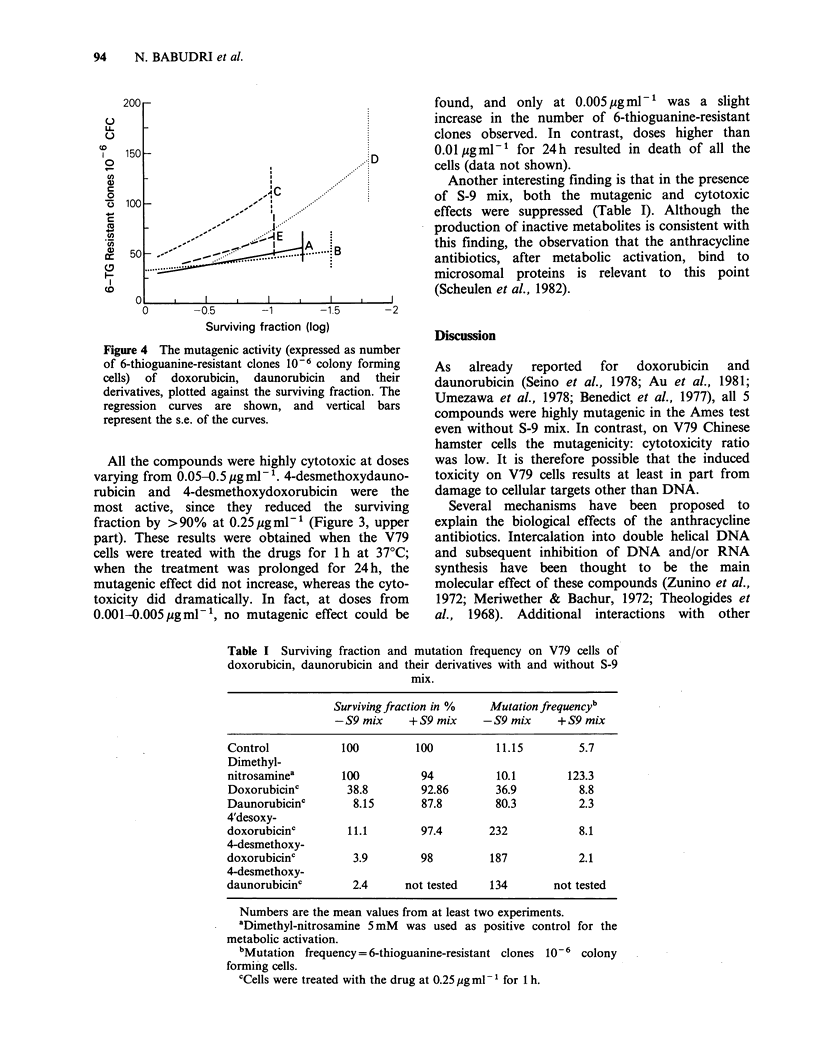
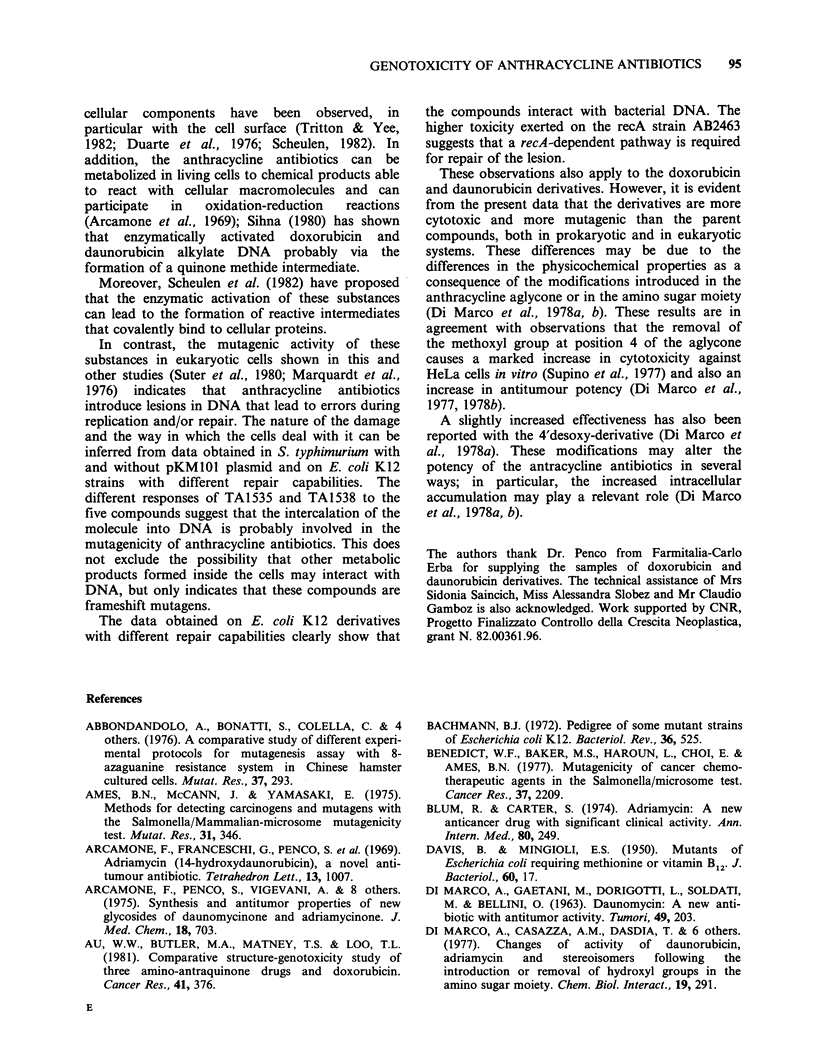
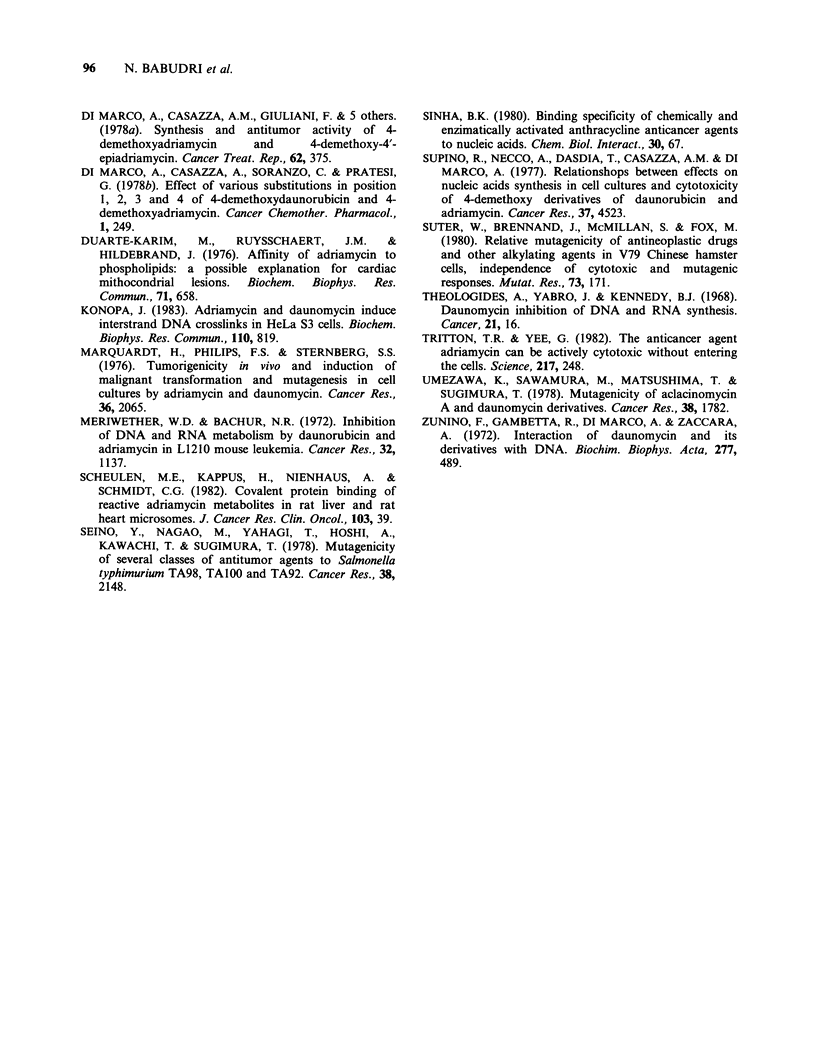
Selected References
These references are in PubMed. This may not be the complete list of references from this article.
- Abbondandolo A., Bonatti S., Colella C., Corti G., Matteucci F., Mazzaccaro A., Rainaldi G. A comparative study of different experimental protocols for mutagenesis assays with the 9-azaguanine resistance system in cultured Chinese hamster cells. Mutat Res. 1976 Nov;37(2-3):293–306. doi: 10.1016/0027-5107(76)90043-9. [DOI] [PubMed] [Google Scholar]
- Arcamone F., Franceschi G., Penco S., Selva A. Adriamycin (14-hydroxydaunomycin), a novel antitumor antibiotic. Tetrahedron Lett. 1969 Mar;(13):1007–1010. doi: 10.1016/s0040-4039(01)97723-8. [DOI] [PubMed] [Google Scholar]
- Arcamone F., Penco S., Vigevani A., Redaelli S., Franchi G., DiMarco A., Casazza A. M., Dasdia T., Formelli F., Necco A. Synthesis and antitumor properties of new glycosides of daunomycinone and adriamycinone. J Med Chem. 1975 Jul;18(7):703–707. doi: 10.1021/jm00241a013. [DOI] [PubMed] [Google Scholar]
- Au W. W., Butler M. A., Matney T. S., Loo T. L. Comparative structure-genotoxicity study of three aminoanthraquinone drugs and doxorubicin. Cancer Res. 1981 Feb;41(2):376–379. [PubMed] [Google Scholar]
- Bachmann B. J. Pedigrees of some mutant strains of Escherichia coli K-12. Bacteriol Rev. 1972 Dec;36(4):525–557. doi: 10.1128/br.36.4.525-557.1972. [DOI] [PMC free article] [PubMed] [Google Scholar]
- Benedict W. F., Baker M. S., Haroun L., Choi E., Ames B. N. Mutagenicity of cancer chemotherapeutic agents in the Salmonella/microsome test. Cancer Res. 1977 Jul;37(7 Pt 1):2209–2213. [PubMed] [Google Scholar]
- Blum R. H., Carter S. K. Adriamycin. A new anticancer drug with significant clinical activity. Ann Intern Med. 1974 Feb;80(2):249–259. doi: 10.7326/0003-4819-80-2-249. [DOI] [PubMed] [Google Scholar]
- DAVIS B. D., MINGIOLI E. S. Mutants of Escherichia coli requiring methionine or vitamin B12. J Bacteriol. 1950 Jul;60(1):17–28. doi: 10.1128/jb.60.1.17-28.1950. [DOI] [PMC free article] [PubMed] [Google Scholar]
- DIMARCO A., GAETANI M., DORIGOTTI L., SOLDATI M., BELLINI O. STUDI SPERIMENTALI SULL'ATTIVITA' ANTINEOPLASTICA DEL NUOVO ANTIBIOTICO DAUNOMICINA. Tumori. 1963 May-Jun;49:203–217. [PubMed] [Google Scholar]
- Di Marco A., Casazza A. M., Dasdia T., Necco A., Pratesi G., Rivolta P., Velcich A., Zaccara A., Zunino F. Changes of activity of daunorubicin, adriamycin and stereoisomers following the introduction or removal of hydroxyl groups in the amino sugar moiety. Chem Biol Interact. 1977 Dec;19(3):291–302. doi: 10.1016/0009-2797(77)90052-7. [DOI] [PubMed] [Google Scholar]
- Di Marco A., Casazza A. M., Giuliani F., Pratesi G., Arcamone F., Bernardi L., Franchi G., Giardino P., Patelli B., Penco S. Synthesis and antitumor activity of 4-demethoxyadriamycin and 4-demethoxy-4' -epiadriamycin. Cancer Treat Rep. 1978 Mar;62(3):375–380. [PubMed] [Google Scholar]
- Di Marco A., Casazza A. M., Soranzo C., Pratesi G. Effect of various substitutions in positions 1, 2, 3, and 4 of 4-demethoxydaunorubicin and 4-demethoxyadriamycin. Cancer Chemother Pharmacol. 1978;1(4):249–254. doi: 10.1007/BF00257158. [DOI] [PubMed] [Google Scholar]
- Duarte-Karim M., Ruysschaert J. M., Hildebrand J. Affinity of adriamycin to phospholipids. A possible explanation for cardiac mitochondrial lesions. Biochem Biophys Res Commun. 1976 Jul 26;71(2):658–663. doi: 10.1016/0006-291x(76)90838-x. [DOI] [PubMed] [Google Scholar]
- Konopa J. Adriamycin and daunomycin induce interstrand DNA crosslinks in Hela S3 Cells. Biochem Biophys Res Commun. 1983 Feb 10;110(3):819–826. doi: 10.1016/0006-291x(83)91035-5. [DOI] [PubMed] [Google Scholar]
- Marquardt H., Philips F. S., Sternberg S. S. Tumorigenicity in vivo and induction of malignant transformation and mutagenesis in cell cultures by adriamycin and daunomycin. Cancer Res. 1976 Jun;36(6):2065–2069. [PubMed] [Google Scholar]
- Meriwether W. D., Bachur N. R. Inhibition of DNA and RNA metabolism by daunorubicin and adriamycin in L1210 mouse leukemia. Cancer Res. 1972 Jun;32(6):1137–1142. [PubMed] [Google Scholar]
- Scheulen M. E., Kappus H., Nienhaus A., Schmidt C. G. Covalent protein binding of reactive adriamycin metabolites in rat liver and rat heart microsomes. J Cancer Res Clin Oncol. 1982;103(1):39–48. doi: 10.1007/BF00410304. [DOI] [PubMed] [Google Scholar]
- Seino Y., Nagao M., Yahagi T., Hoshi A., Kawachi T., Sugimura T. Mutagenicity of several classes of antitumor agents to Salmonella typhimurium TA98, TA100, and TA92. Cancer Res. 1978 Jul;38(7):2148–2156. [PubMed] [Google Scholar]
- Sinha B. K. Binding specificity of chemically and enzymatically activated anthracycline anticancer agents to nucleic acids. Chem Biol Interact. 1980 Apr;30(1):67–77. doi: 10.1016/0009-2797(80)90115-5. [DOI] [PubMed] [Google Scholar]
- Supino R., Necco A., Dasdia T., Casazza A. M., Di Marco A. Relationship between effects on nucleic acid synthesis in cell cultures and cytotoxicity of 4-demethoxy derivatives of daunorubicin and adriamycin. Cancer Res. 1977 Dec;37(12):4523–4528. [PubMed] [Google Scholar]
- Suter W., Brennand J., McMillan S., Fox M. Relative mutagenicity of antineoplastic drugs and other alkylating agents in V79 Chinese hamster cells, independence of cytotoxic and mutagenic responses. Mutat Res. 1980 Nov;73(1):171–181. doi: 10.1016/0027-5107(80)90145-1. [DOI] [PubMed] [Google Scholar]
- Theologides A., Yarbro J. W., Kennedy B. J. Daunomycin inhibition of DNA and RNA synthesis. Cancer. 1968 Jan;21(1):16–21. doi: 10.1002/1097-0142(196801)21:1<16::aid-cncr2820210104>3.0.co;2-4. [DOI] [PubMed] [Google Scholar]
- Triton T. R., Yee G. The anticancer agent adriamycin can be actively cytotoxic without entering cells. Science. 1982 Jul 16;217(4556):248–250. doi: 10.1126/science.7089561. [DOI] [PubMed] [Google Scholar]
- Umezawa K., Sawamura M., Matsushima T., Sugimura T. Mutagenicity of aclacinomycin A and daunomycin derivatives. Cancer Res. 1978 Jun;38(6):1782–1784. [PubMed] [Google Scholar]
- Zunino F., Gambetta R., Di Marco A., Zaccara A. Interaction of daunomycin and its derivatives with DNA. Biochim Biophys Acta. 1972 Sep 14;277(3):489–498. doi: 10.1016/0005-2787(72)90092-5. [DOI] [PubMed] [Google Scholar]


